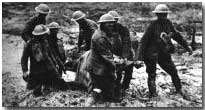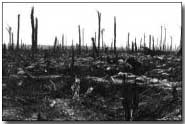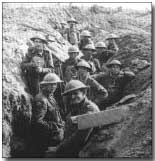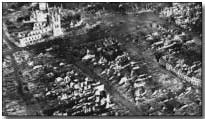Memoirs & Diaries - Artillery Devastation at Third Ypres
 31 July 1917
31 July 1917
Never-ending howls and piercing screams are rending the air from the sea to the River Lys, while accessory noises like growls and blows seem to spring from everywhere on the Yser, in front of Dixmude and Langemarck, around Hollebeke and Warneton.
The whole of West Flanders is one large, steaming pot, in which death and devastation are brewing. With the sun smiling its brightest at us, terrific, never-ending thunderstorms are raging over the land. Amid noises such as the old earth never heard before, a crop of new battles and new wars between nations is growing to maturity.
What were the battles of the Somme, Arras, the Aisne, and Champagne against this earthquake of Flanders? Millions of capital are blown up in the air and explode in the ground. It is like a Cyclopean concert of unheard-of brutality, to celebrate with becoming fitness the end of the third years of universal madness.
The louder the desire of the nations for peace begins to express itself, the wilder the thunder of the guns at England's command to drown any cry of hope. Sometimes one thinks the end of the bloody intoxication is coming, but there are still graduations of description for which there are no words.
We thought we had got accustomed to the atrociousness of all this, and at home you may forget the monstrous events. At the front for days our senses and nerves must certainly have suffered from these awful three years. Spirit and feelings seek to escape the intolerable horror, but it is no use. Here, up against the worst form of slaughter, again these nameless noises bring it home to you with overpowering force.
 This
battle has lasted for days; now it is again that continuous roar that
effaces, or rather, consumes, all individual noises, that makes even fierce
explosions close by you indistinguishable. Everything disappears in
one loud, rolling, threatening volume of sound. The air carries it a
hundred miles distant, and tremblingly they listen, south and north, west
and east, where they cannot see the horror of all this.
This
battle has lasted for days; now it is again that continuous roar that
effaces, or rather, consumes, all individual noises, that makes even fierce
explosions close by you indistinguishable. Everything disappears in
one loud, rolling, threatening volume of sound. The air carries it a
hundred miles distant, and tremblingly they listen, south and north, west
and east, where they cannot see the horror of all this.
But if you come nearer, it is like the bowels of the earth exploding. Our soldiers sit in their dugouts, and cannot do anything but trust to luck. Just now the infantry must keep quiet; only the big guns are talking. The waiting infantry is, as it were, locked in prison. The men cannot get out, nor can anybody approach them. The way to them is fraught with fearful danger.
All around spatter steel splinters, shrapnel bullets, stones and earth. If you are hit you are dead or crippled. What shall one do? One smokes incessantly, until the air in the narrow shaft is heavy enough to cut. That is bad, but somehow it helps one to endure the horrors of the situation.
You live for days in the closest contact with your comrades in a contracted space. You cannot move, and are unable to think clearly. Never did I realize how difficult it can be to lead a human life. There is nameless agony in it.
Suddenly there is a terrible explosion quite near you. The earth is moving. Splinters drop from nowhere. Our works have been hit at an adjacent point, but thank Heaven! there are no wounded. Nobody was stationed there when the projectile struck.
There is still another explosion, this time the other side of us. Nine dugouts have been hit and have collapsed.
Then there is one of those rare lulls in the cannonade, and quite distinctly we make out some of our comrades struggling in the ruins of a wrecked dugout. We rush to their aid, heedless of the shells bursting around us. Another of those deadly beasts strikes almost at our feet, but it does not explode. We don't stop; we rush on; we shout to our friends, who are buried under the earth, stones, and timber, and we set to work digging them out.
"Nobody is seriously hurt," they cry joyously, when we drag them, covered with scratches and contusions, to daylight again. We do not always fare so well as this. Sometimes we dig them from cellars and earthworks as corpses, sometimes fearfully mutilated, or just in time to draw their last breath.
 But
after all, our losses are not so large - certainly not compared with the
mass of munitions exploded. Our men have become masters in the art of
dodging and using cover.
But
after all, our losses are not so large - certainly not compared with the
mass of munitions exploded. Our men have become masters in the art of
dodging and using cover.
They certainly have had experience enough. But still too many sons of German mothers must yield up their young lives mutely without a chance of defending themselves.
But they all realize that only the Fatherland counts; that the individual cannot claim special attention here. The heavy twenty-four-centimetre projectiles of the enemy care not where they strike, be it human life, wire entanglements, or trench, and sometimes they hit our nerves though they strike many metres distant.
There is one consolation: Our artillery pays them back with interest, and the hellish noises at our rear are almost music to the ears of our men in our dugouts. Once upon a time infantrymen used to swear at artillery in battles; nowadays you hear nothing of the kind. Our infantry knows that those men behind their guns are having a hell of a time, while the infantryman is comparatively safe in his dugout.
But even the artillery needs our infantryman. He must carry munitions to positions that are inaccessible to horses and carts. The infantryman must watch the approaches to the artillery positions from all sides, and must be at his post when the sign is given for a general advance.
Is this the end of terror, or merely the lull before the attack? Fiercely your fist grips gun and hand grenade. The eyes of the men on guard pierce the dense darkness ahead. There rises a green fireball. Is it ours? Is it theirs? Nobody seems to know its meaning, but all of a sudden the English begin to rain steel again.
We give them tit for tat. The artillery on each side seems to try to surpass that on the other. What has happened? Nothing particular, but since they were at it, they thought they might as well keep hammering, and that one long roar continues until the sun rises again on a new day as cruel as yesterday. Nobody will ever forget the horror of it.
1 August 1917
 The
great brutal force of the initial blow has been parried. We survived
the gruesome tension occasioned by the uncanny artillery fire, and we are
able again to hold our heads high as the battle of living men is resumed.
The
great brutal force of the initial blow has been parried. We survived
the gruesome tension occasioned by the uncanny artillery fire, and we are
able again to hold our heads high as the battle of living men is resumed.
The struggle has now reached the phase of human effort, after unseen mechanical death has been knocking at the door day and night for weeks. The German fighting spirit was fully awakened, and heroes flung themselves from the islands of defence in the conquered district against the advancing masses and seriously weakened the flanks of the oncoming troops.
Millions of shells have been spent, and now comes the test of strength and nerves.
The mainspring which impelled the German fighting man was the strong realization that he was here called upon to defend the German U-boat - to serve the mightiest, most promising weapon of his country and bar the path to it with his life.
The German troops counter-attacked in frightful bayonet and hand grenade combats. It was the mightiest counter-thrust, following the mightiest impact, which the world has ever seen.
Nightfall witnessed the happy German achievement. The foe had won German trenches, had gained control of Bixschoote, and had carried off prisoners, but he lay bleeding at the foot of the wall he desired to scale.
Source: Source Records of the Great War, Vol. V, ed. Charles F. Horne, National Alumni 1923
Photographs courtesy of Photos of the Great War website.
"Bully Beef" comprised cans of boiled or pickled beef used by the British Army.
- Did you know?
